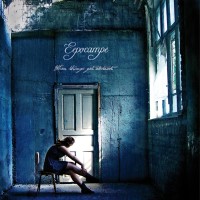Arriving, as it did, without any form of promotional blurb, I was rather unsure what to expect from the oddly monikered Eepocampe, although the CD came from a highly respected source so I was sure that it would be interesting. As it transpired, despite a cover that suggests the band opt for a gothic sound, the actual content sits neatly between London-based noisters Seafood and the quieter end of Sonic Youth and the results are frequently original and spectacular.
Opening with a sample of a news report about the world’s current financial straits, the opening track ‘Lions and elephants’ is more of a scene-setter than an attention grabber; lead singer Antony Lourdel has a good voice that holds its tune, but it takes a moment to become accustomed to and putting it up front and centre over a gently picked melody is a gamble that ultimately pays off but which requires a little patience on the listeners side. As the tune builds to a crescendo, the guitars slowly evolve, beginning to fizz and hum in a manner reminiscent of the late, lamented mid-nineties alternative bands such as Urusai Yatsura and the aforementioned Seafood and by the end of the track you’re firmly settled into Eepocampe’s off-kilter world. ‘Heart of volunteer’ is up next with its rippling guitar lines redolent of a Mogwai-with-vocals and a subtle, well placed string-section line adding colour to the track. It’s a beautiful track with a strong melody that, in a perfect world, would be crawling up the charts instead of the identikit, pop-idol rubbish that obscures any view of real music in this country, but maybe that misses the point of alternative music and we should be grateful that Eepocampe have put this out there for the faithful fans who will appreciate the subtle dynamics and unconventional nature of their work. An early highlight, ‘odyssey’ is next and while it begins as a fragile song, all rim-shot snare beats and reverb guitar, it soon turns into a raging torrent of sound that batters away at you whilst still retaining a wonderful sense of melody – a trick that Arab Strap used to pull off so well on tracks such as ‘girls of summer’. It’s something that seems to have disappeared from the music scene altogether in recent years and it’s wonderfully refreshing to hear Eepocampe put their own unique spin on the genre.
Having hinted at a desire for a lengthy epic on the previous songs, Eepocampe finally flex their musical muscle on the nine-minute stunner ‘when things get abstract’ – an instrumental work of immense beauty and muscularity, particularly as samples are shot through the track while Anthony Wailly pounds his toms for all their worth, propelling the track forward with a depth and vigour that it took Mogwai at least several EPs to acquire. The track forms a stunning centrepiece to the album, a peak that the other tracks lead toward and subsequently away from, slowly returning you to earth after a scintillating ascent that leaves you gasping and breathless and staring wide-eyed at the view. ‘Indecisive mind’ sees the band veering into more energetic territory, with an almost punkish vocal set to the cascading guitars and almost at odds with the effortlessly majestic track that precedes it. ‘Polaroid fades’ has a nice off-kilter beat and decent vocal harmonies, not to mention a flaming guitar bridge whilst the lengthier ‘soliloquies of a further death’ shifts between elements of post rock and Smashing Pumpkins ‘Porcelina…’ for a melodic, dreamy track overlaid with Alexis Medina’s inspirational bass work. The final track, ‘Neumonal realm’ closes the album with a lengthy build-up leading to the final flailing guitar pyrotechnics that leave you on a high, exhausted by the shifting moods and raging highs of an album that combines some of the best elements of post-rock and alternative music to create a melodic, often exciting set.
Overall this is an album that will appeal greatly to those who miss the spiky, angular alt-rock bands that found favour in the wake of Nirvana’s distressing demise. Referencing any number of bands, Eepocampe have a strong grasp of melody and dynamic and they deserve to go far. My one criticism is the album is not as cohesive as it could be, with the second half suffering marginally in comparison to the astonishing ‘when things get abstract’. That is, however, a very minor criticism and on the whole I would strongly recommend this album to fans of thoughtful, contemplative, melodic music with bite – you will not be disappointed by what is on offer here.




